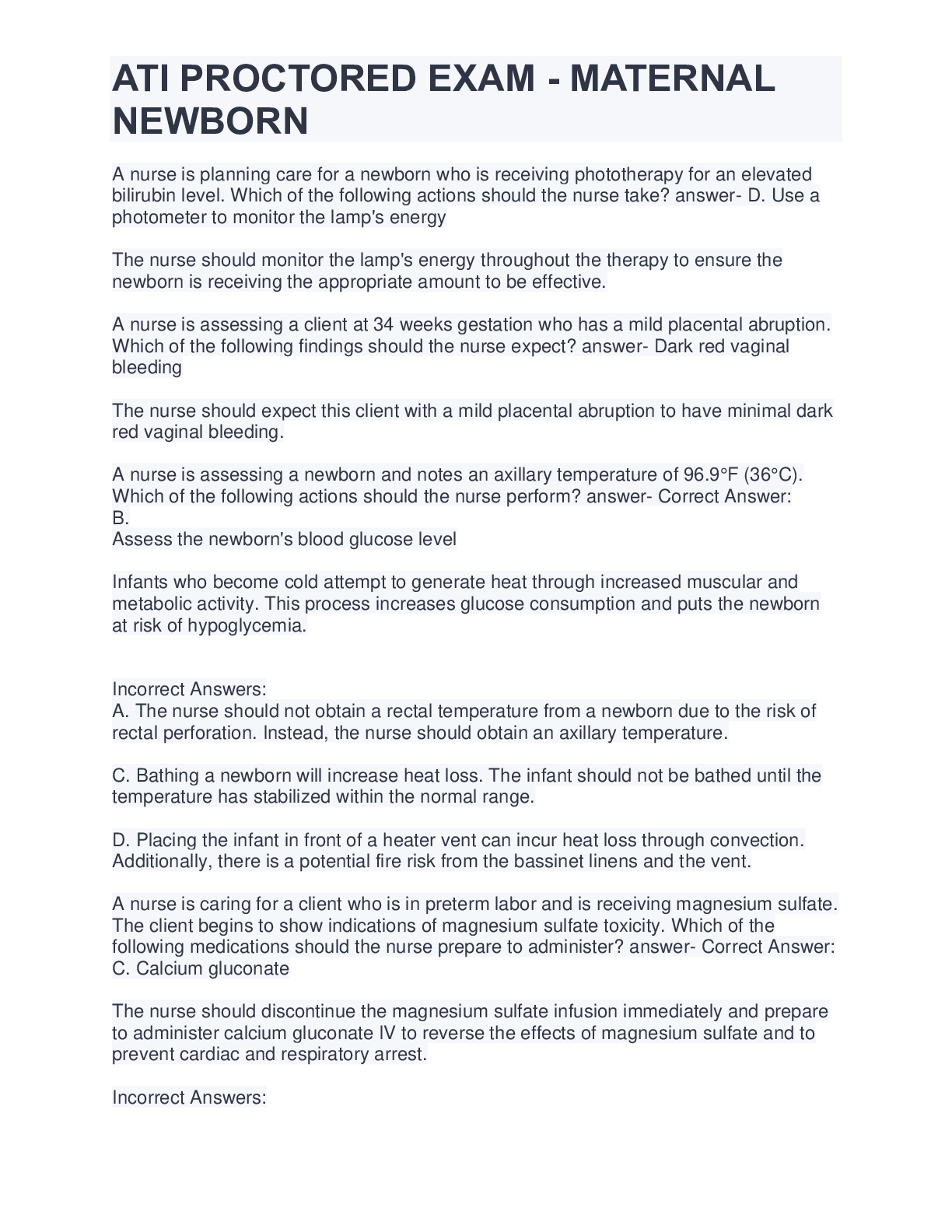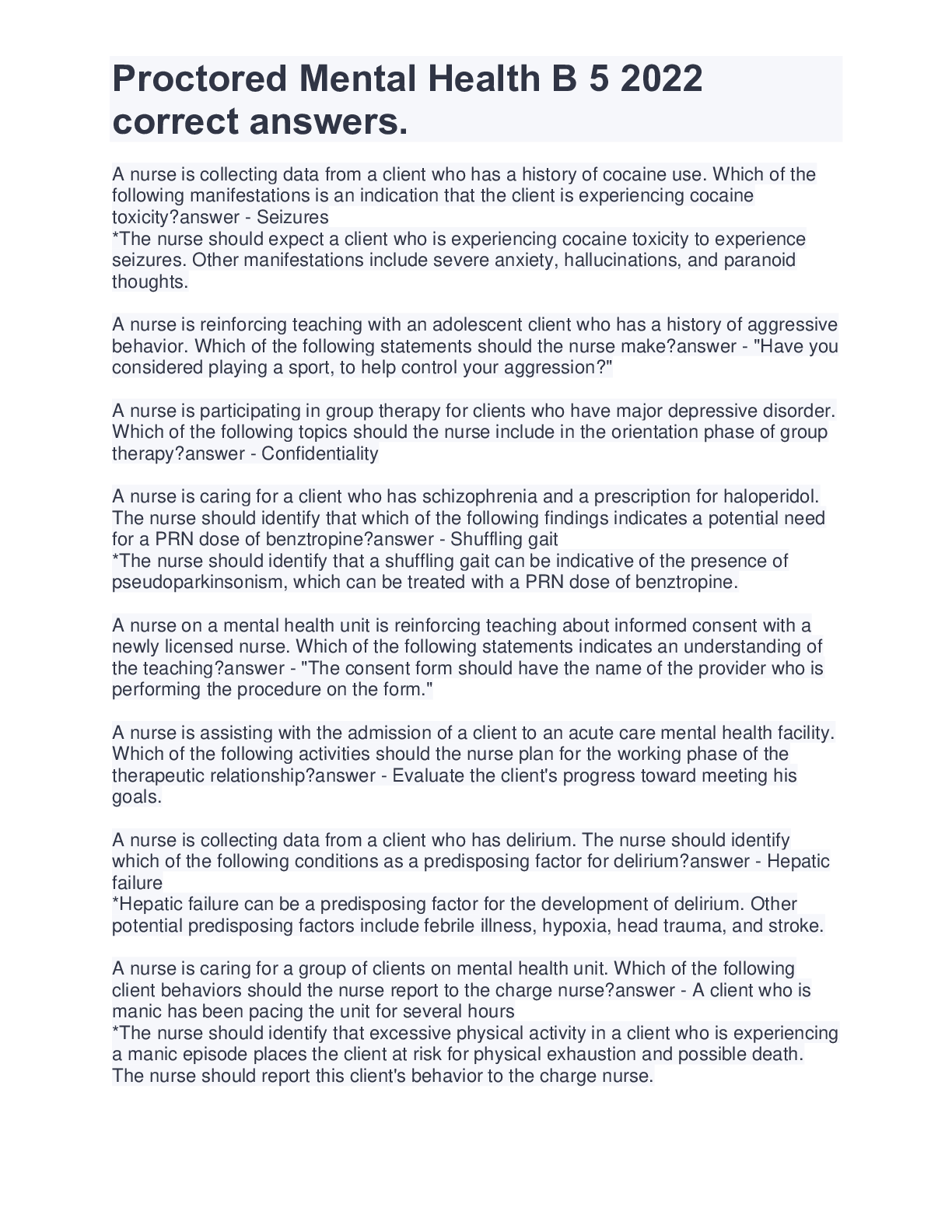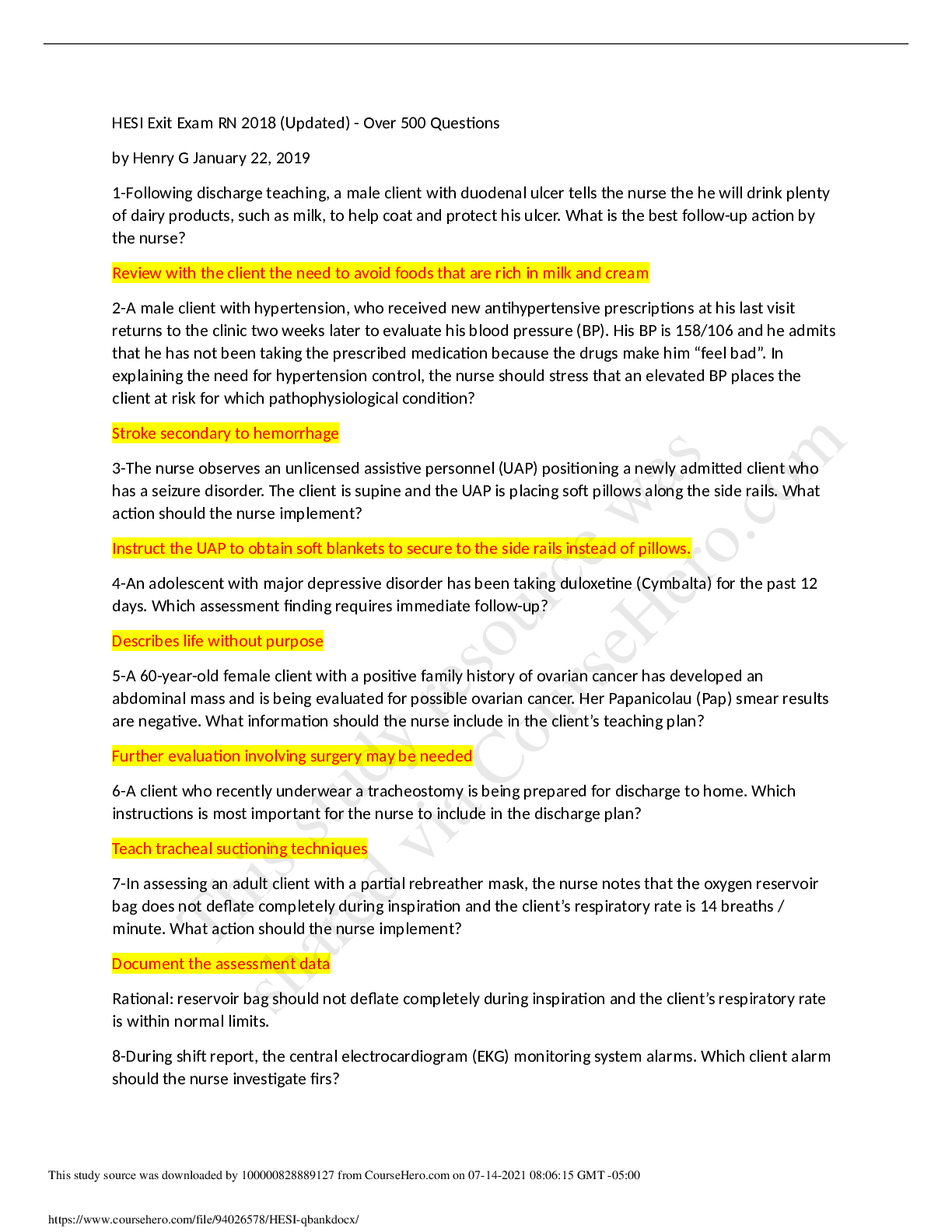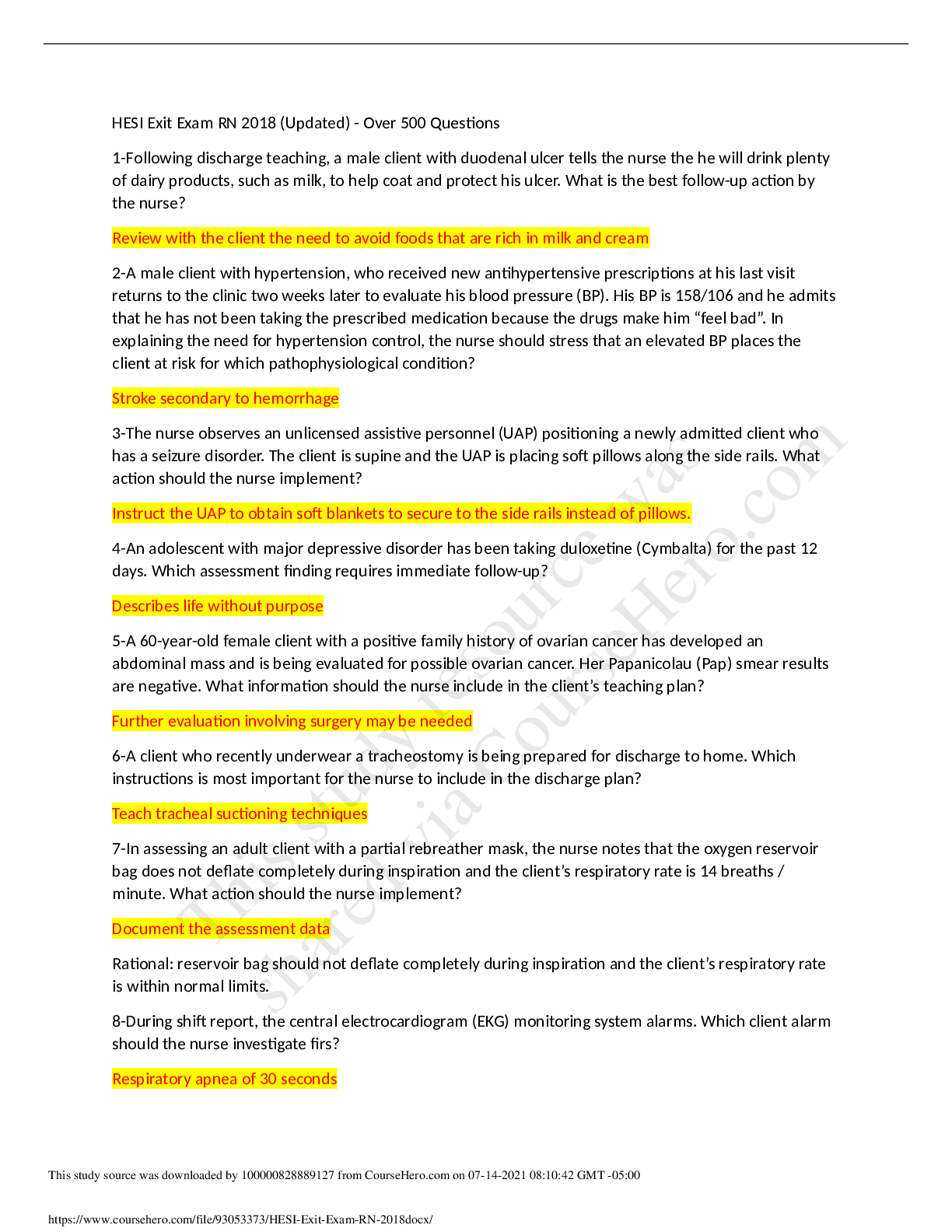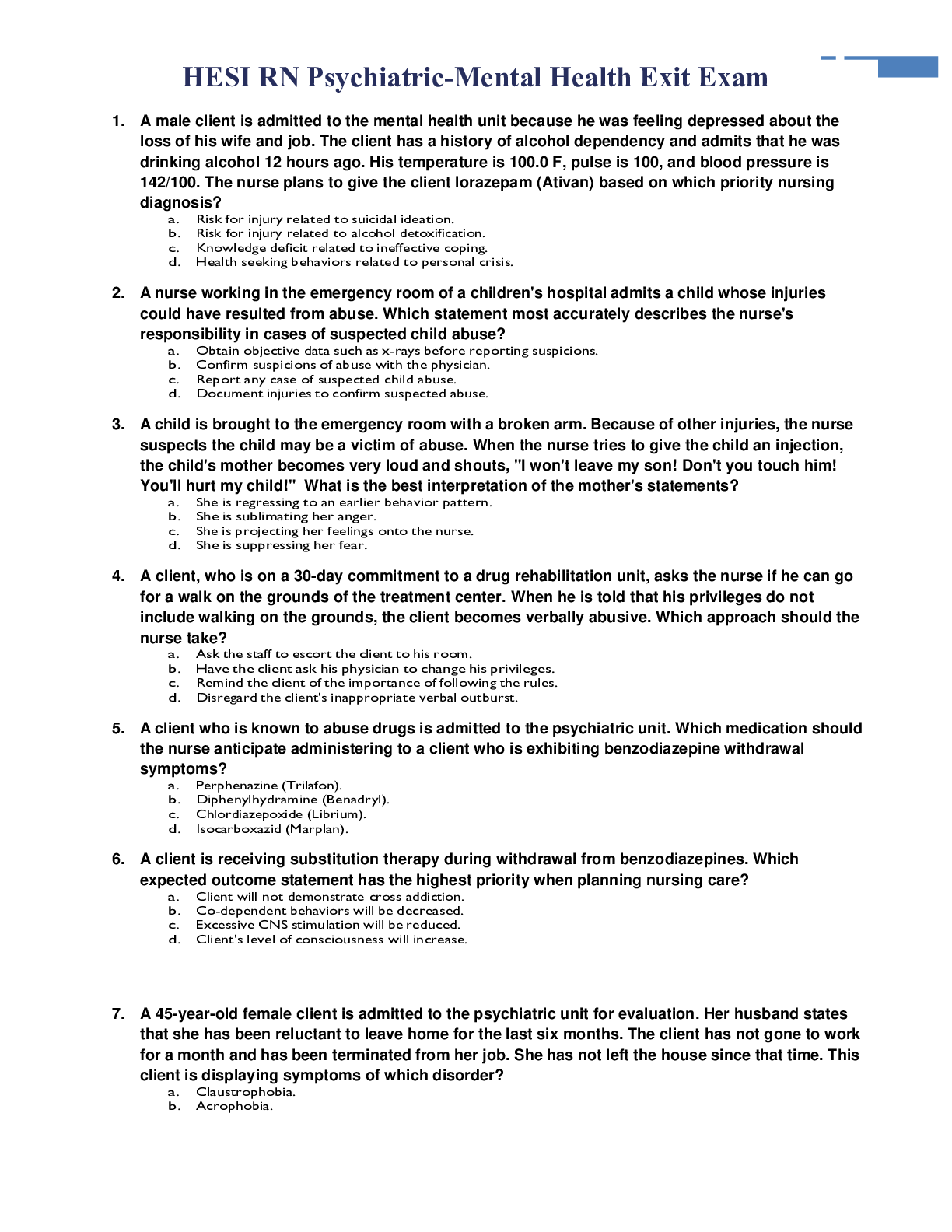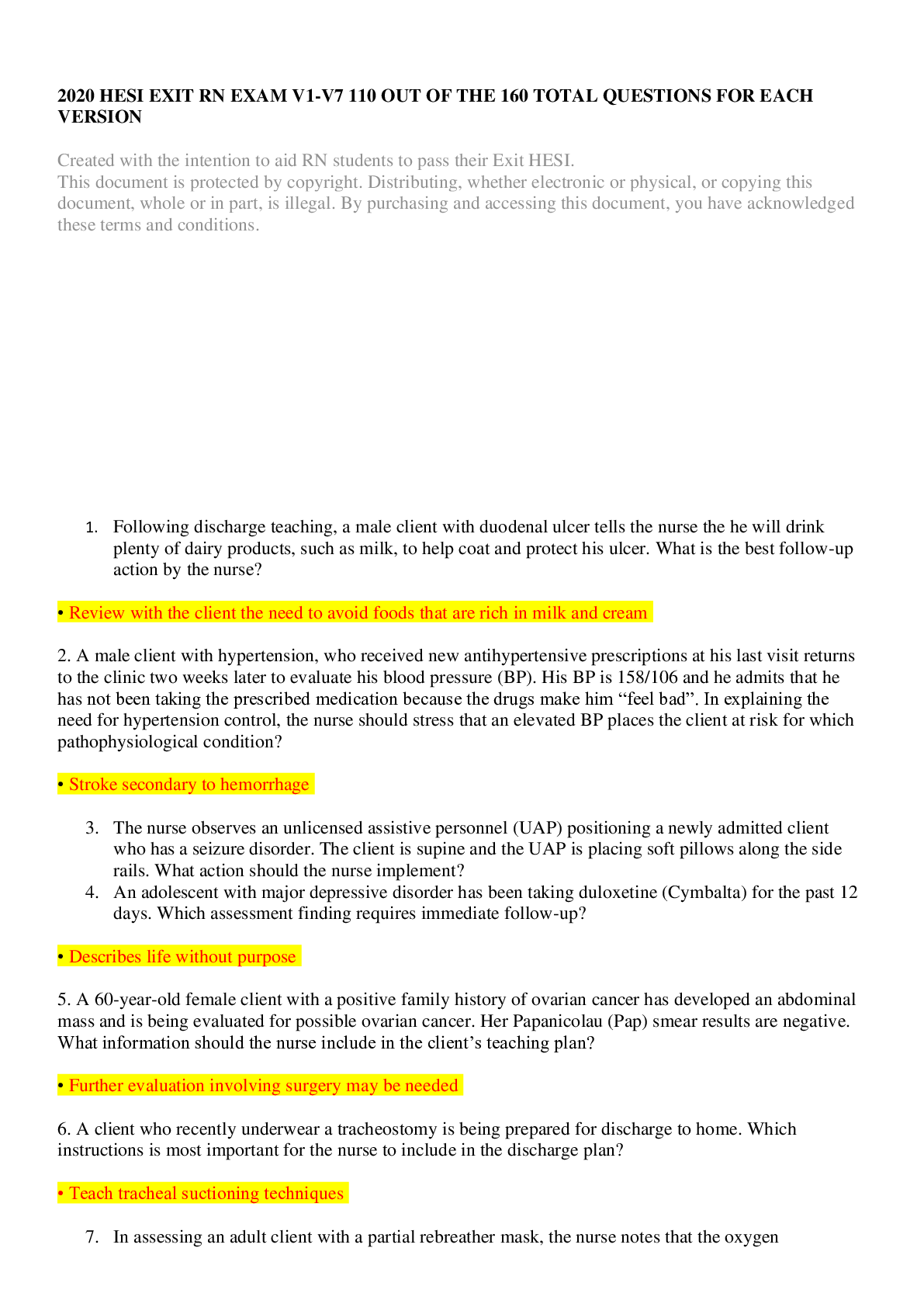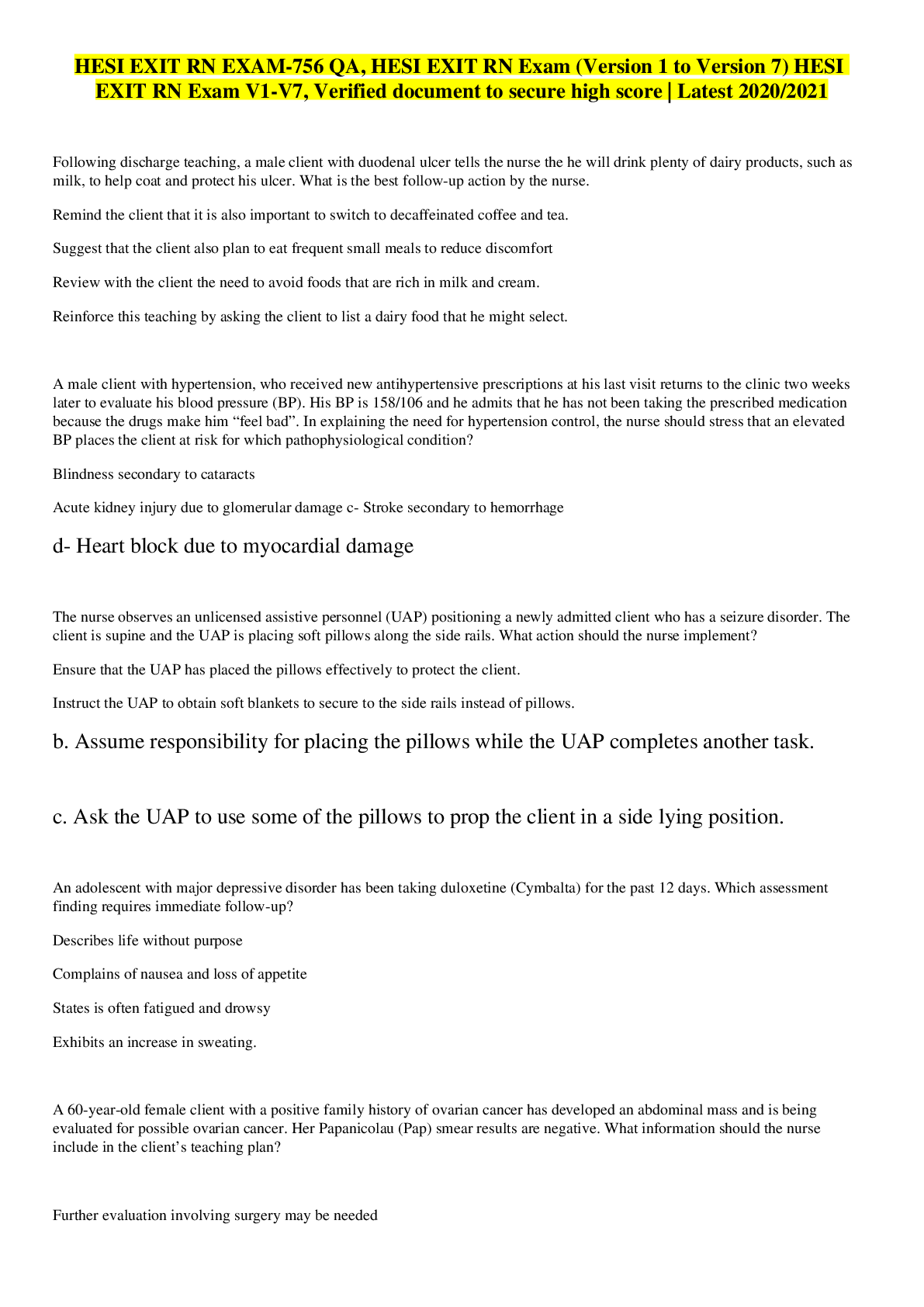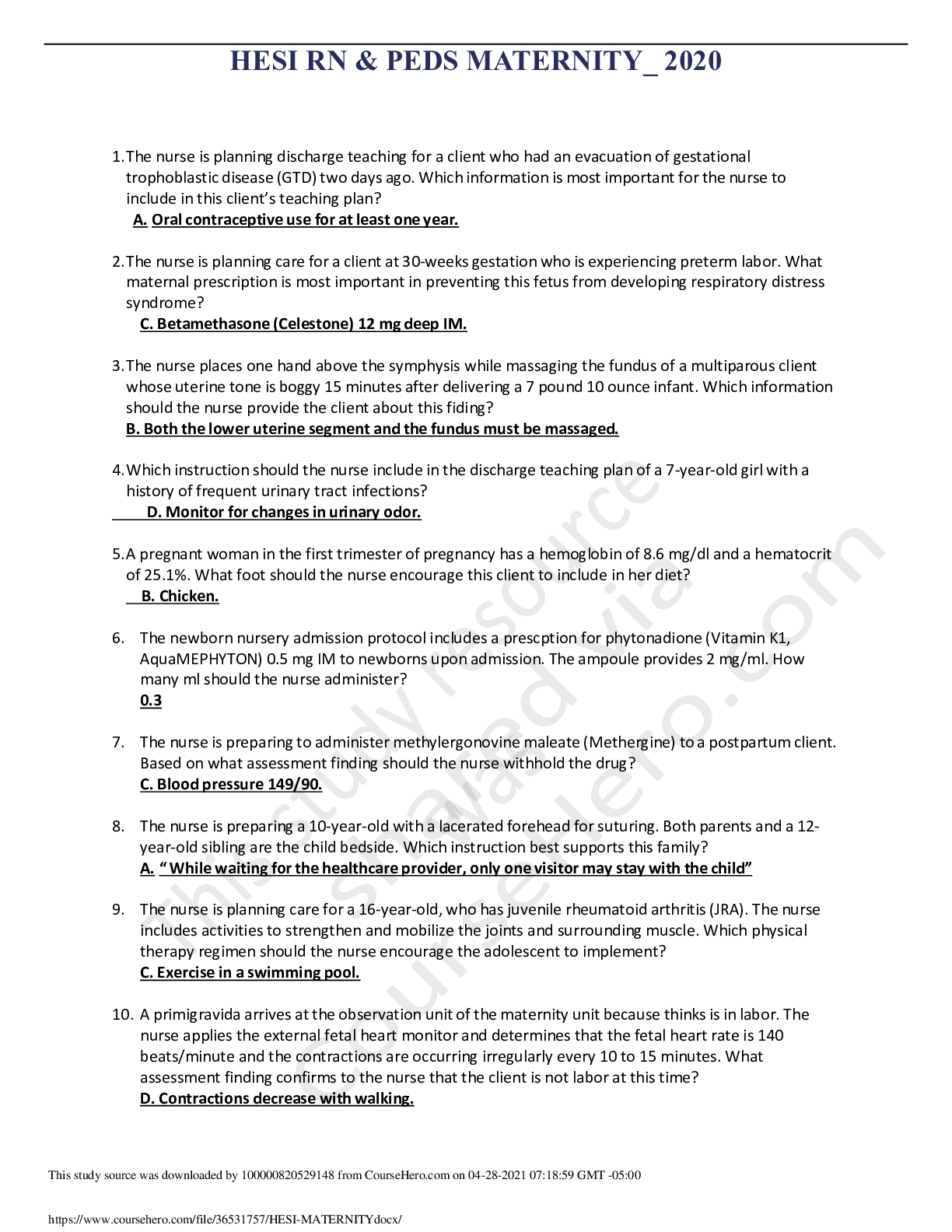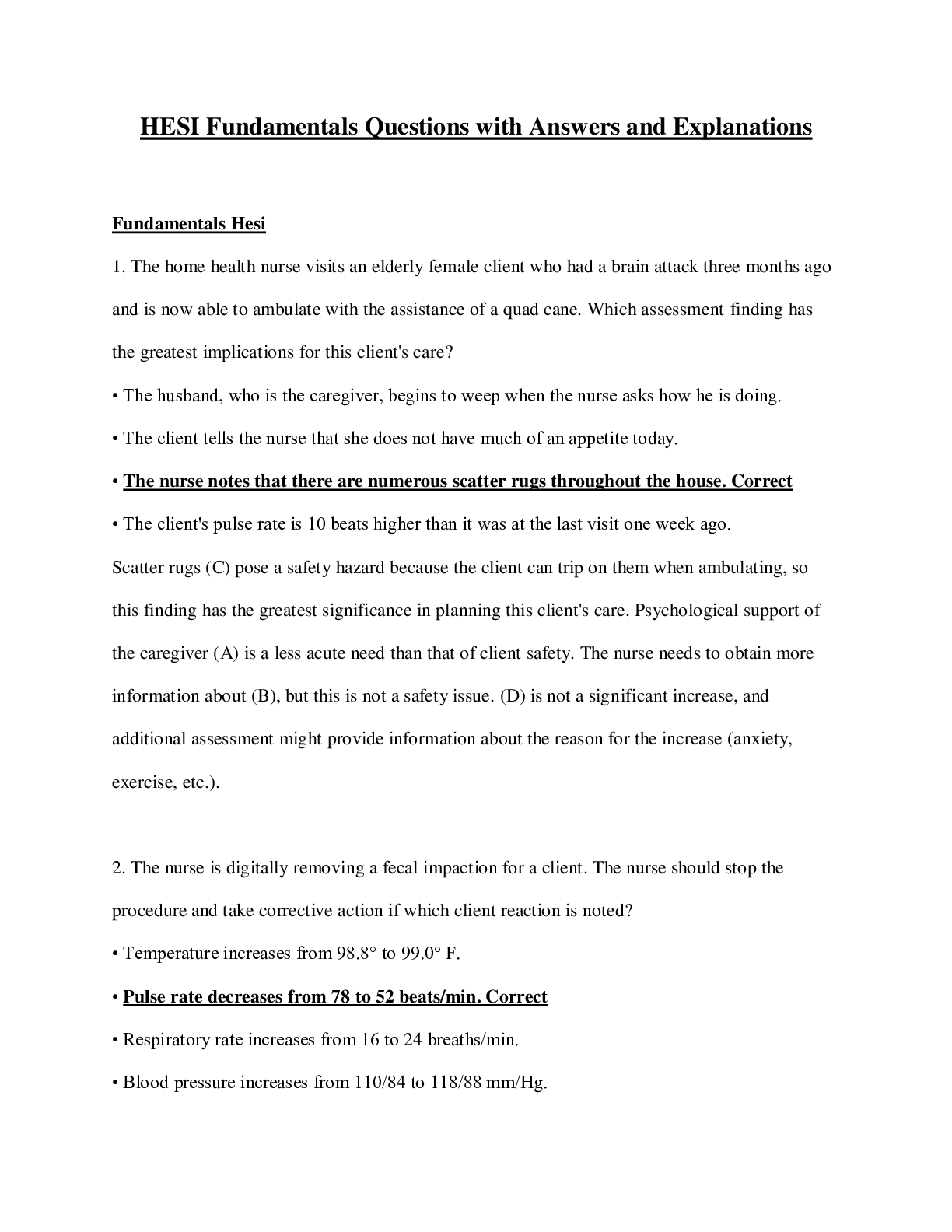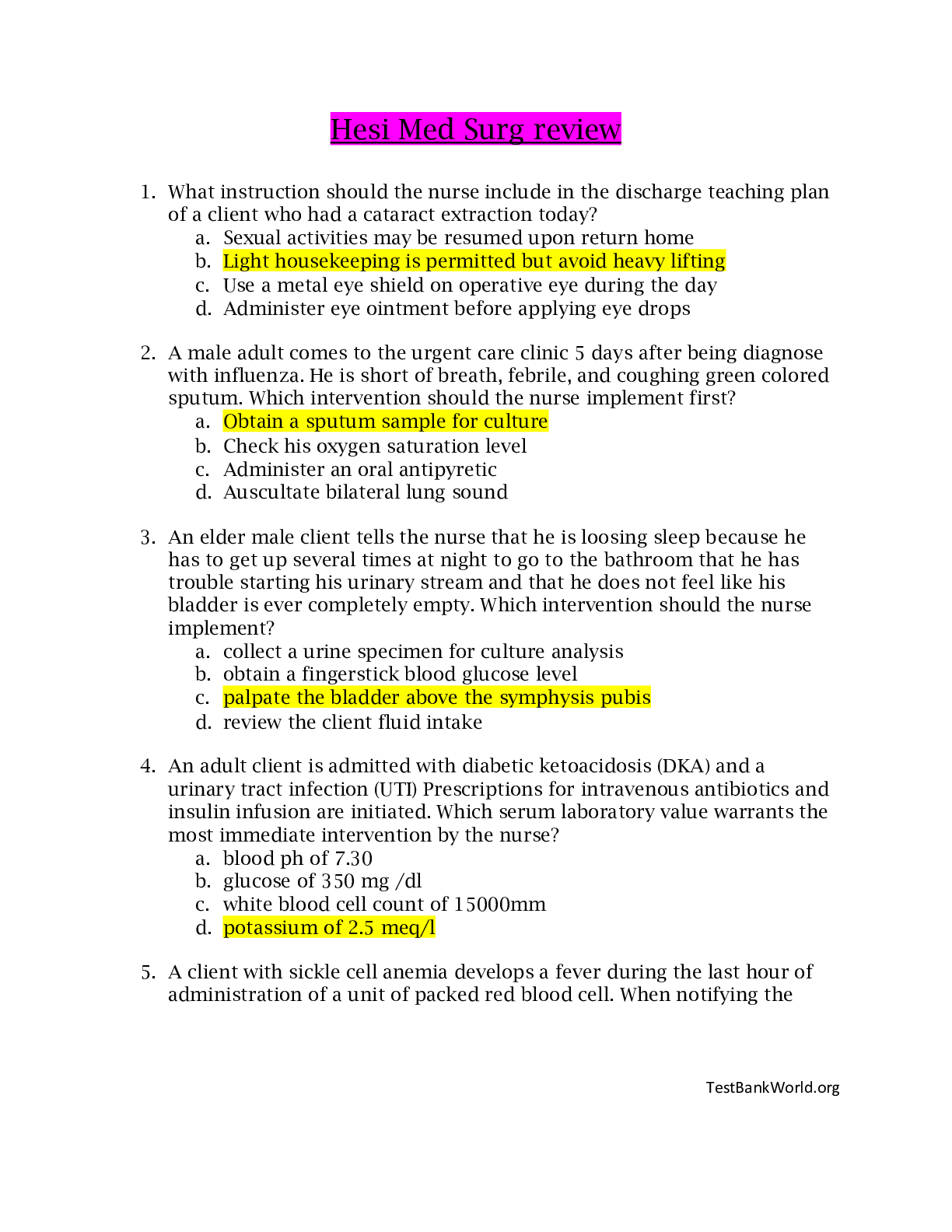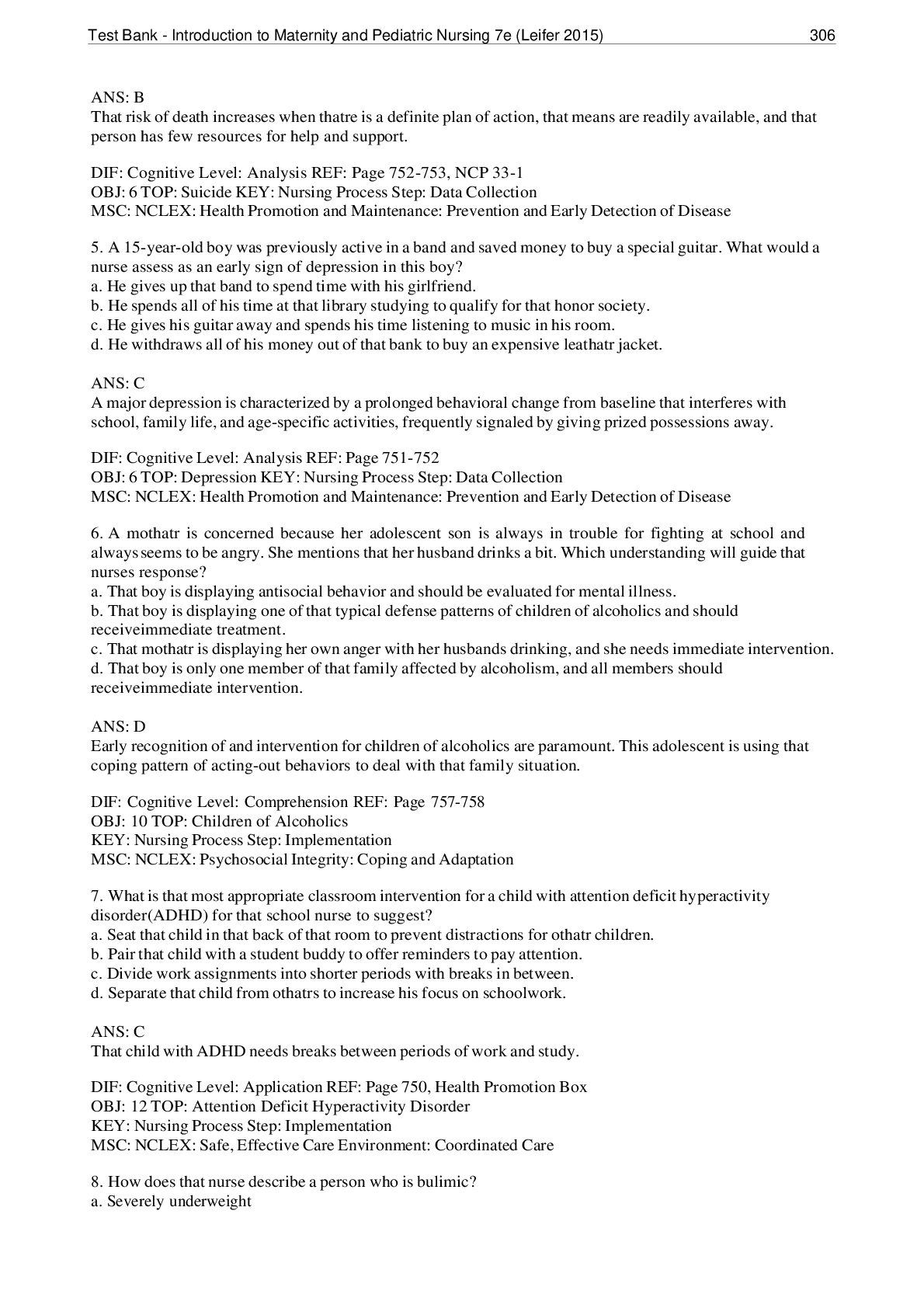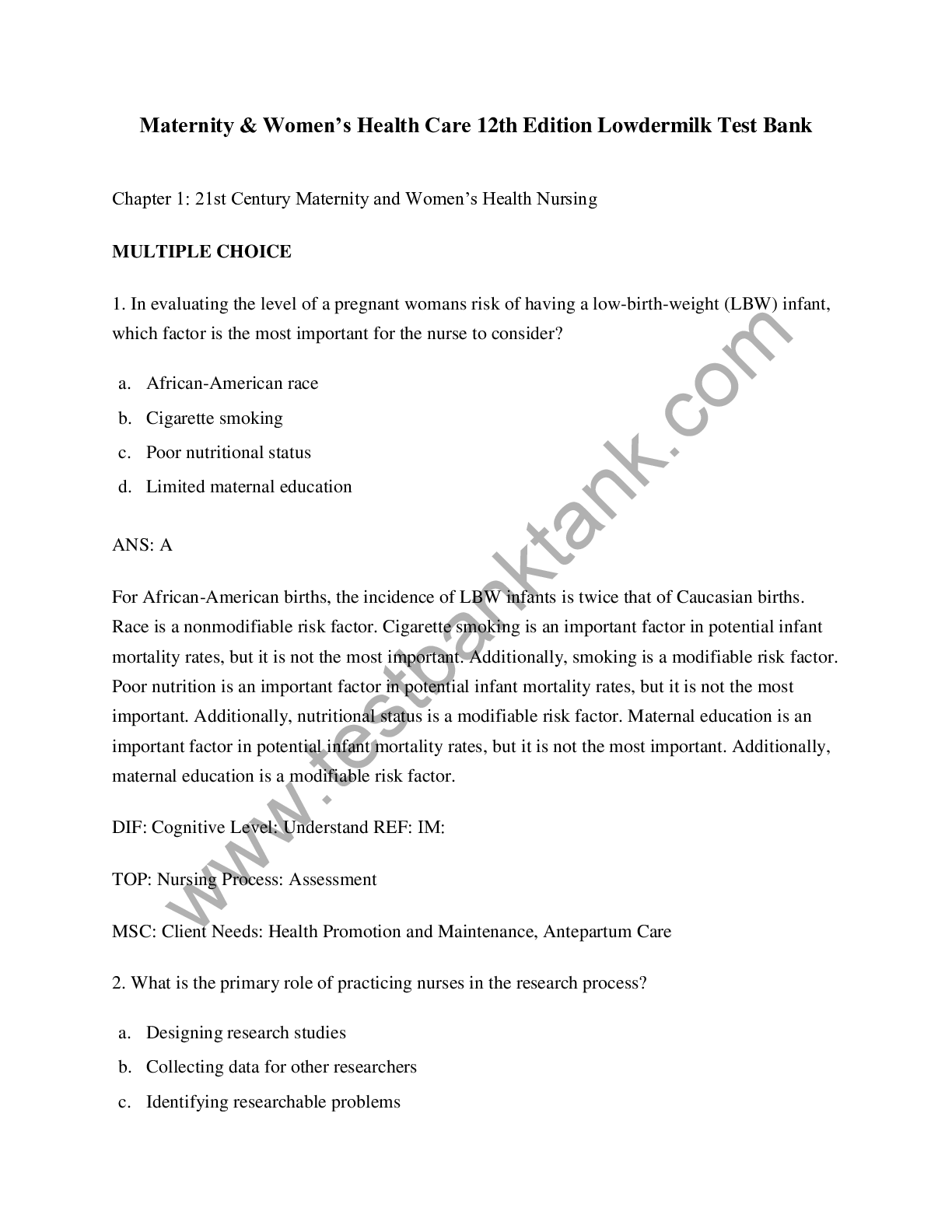*NURSING > EXAM > Psychotherapy for the Advanced Practice Psychiatric Nurse, Second Edition: A How-To Guide for Eviden (All)
Psychotherapy for the Advanced Practice Psychiatric Nurse, Second Edition: A How-To Guide for Evidence- Based Practice 2nd Edition Test Bank
Document Content and Description Below
Psychotherapy for the Advanced Practice Psychiatric Nurse, Second Edition: A How-To Guide for Evidence- Based Practice 2nd Edition Test Bank Chapter 1. The Nurse Psychotherapist and a Framework for Pr... actice Question 1 The nurses new job description at the generalist level of practice reflects the definition of psychiatricmental health nursing and the PsychiatricMental Health Nursing Standards of Practice (ANA, APNA, ISPN). In which of the following areas might the nurse plan programs and intervention to fulfill employment expectations? Standard Text: Select all that apply. 1. Stress management strategies 2. Early diagnosis of psychiatric disorders 3. Parenting classes for new parents 4. Family and group psychotherapy 5. Medication teaching for anti-anxiety medications Question 2 Type: MCSA The nurse is serving on a committee charged with reviewing the roles and responsibilities of the nurses on the psychiatric unit. Which publication should the nurse bring to the first meeting? 1. Diagnostic and Statistical Manual of Mental Disorders 2. American Nurses Credentialing Center certification requirements 3. American Nurses Association, Code of Ethics 4. PsychiatricMental Health Nursing Standards of Practice Question 3 The psychiatricmental health nurse reflecting on professional role activities is referred to the standards of professional performance by a colleague. To which organization should the nurse look for guidance? 1. North American Nursing Diagnosis Association 2. American Nurses Credentialing Center 3. National League for Nursing 4. American Nurses Association Question 4 The psychiatricmental health nurse is working with the new graduate nurse who is orienting to the psychiatric unit. Which comment by the new graduate indicates further clarification of the generalist-nursing role is needed? 1. I would feel better if you would look at my documentation that addresses progress toward treatment goals. 2. I will spend time each day evaluating the effectiveness of the therapeutic milieu. 3. I am a little nervous about conducting psychotherapy with clients. 4. I am doing some reading on how to incorporate complementary interventions into treatment plans. Question 5 The client on the psychiatric unit is asking questions about prevention of sexually transmitted diseases. Given the PsychiatricMental Health Nursing Standards of Practice, which action would be most appropriate for the nurse to take at this time? 1. Consult with the mental health care team. 2. Teach safer sexual practices. 3. Investigate the questions in individual psychotherapy. 4. Notify the attending psychiatrist. . Question 6 The client asks the nurse if certain changes can be made in the unit milieu. Which action by the nurse indicates understanding of the nursing role in the therapeutic milieu? 1. The nurse refers the clients requests to the psychiatric social worker. 2. The nurse discusses the desired changes with the client. 3. The nurse refers the clients requests to the psychosocial rehabilitation worker. 4. The nurse instructs the client that no changes can be made. . Question 7 The nurse assesses that the mental health client has problems choosing productive, safe leisure activities. Which member of the mental health team should the nurse consult with? 1. Recreational therapist 2. Occupational therapist 3. Attending psychiatrist 4. Clinical psychologist . Question 8 Upon arrival on the psychiatric unit this morning, which activity should be the nurses focus? The nurse should do which of the following? 1. Review psychological testing results for all clients. 2. Schedule the individual therapy sessions for all clients. 3. Identify community resources for clients to be discharged this morning. 4. Assess each client for whom the nurse will be providing care. . Question 9 Due to a staff members absence, the nurse is reviewing staff assignments for the day. Which task can the nurse delegate to the psychosocial rehabilitation worker? 1. Conflict resolution teaching to a small group of clients 2. Comparison of physicians orders with the medication records 3. Routine medication administration to a stable client 4. Assessment of a long-term client Question 10 The clients treatment plan includes teaching related to possible side effects of psychotropic medications. Which member of the mental health team should plan to implement the teaching? 1. The psychosocial rehabilitation worker 2. The primary therapist 3. The psychiatrist 4. The nurse Question 11 The mental health team nurse is having some role issues regarding how best to facilitate client progress toward therapeutic goals. What is the priority action by the nurse in order to aid the team as they assist the client? 1. Acknowledge the diversity of the mental health team. 2. Recognize that conflict is natural and expected. 3. Determine personal values, biases, and goals. 4. Attend all mental health team meetings. Question 12 The nurse reflecting on the nursing role within the mental health team, understands that the main purpose of delivering care using a multidisciplinary team is to do which of the following? 1. Maximize the efficiency of the health care team with each team member learning from the others. 2. Increase the opportunity for interpersonal interaction among the client, family, and team members. 3. Facilitate the case management process by delivering care using a multidisciplinary health care team. 4. Make the best use of the different abilities of mental health team members in order to facilitate client progress. Question 13 Observation of the behavior of the mental health team seems to indicate that one team member is primarily interested in client progress as a measure of their knowledge and expertise. Given the nurses knowledge of game theories, this team member might be functioning as which of the following? 1. Rivalist 2. Leader 3. Enabler 4. Maximizer Question 14 The nurse is planning activities to enhance collaboration within the mental health care team. Which activities will be helpful toward this goal? Standard Text: Select all that apply. 1. Identification of ways to minimize diversity among team members 2. Discussion of decisions that require team unity 3. Identification of ways to ignore individual power bases 4. Review of interpersonal communication skills 5. Discussion of decisions that can be made autonomously Question 15 The nurse is admitting a client to the psychiatric unit. Which nursing action is correct? 1. Instruct the client that all information gathered during the assessment will be shared with the mental health team. 2. Alert the client that the psychiatrist will do all the intake assessment to maximize the efficiency of the team. 3. Discuss with the client information that is to be shared with family members and the mental health team. 4. Instruct the client that the mental health team will decide what the client needs to do in treatment. Question 16 The correct response of the nurse who is asked if Florence Nightingale had any impact on the role of the nurse in psychiatricmental health nursing should be which of the following? 1. No, Nightingale focused her ideas on nursing education rather than direct client care. 2. Yes, Nightingale was among the first to note that the influence of nurses has psychological components. 3. No, Nightingale emphasized the physical environment for healing. 4. Yes, Nightingale developed the idea of the therapeutic relationship. Question 17 The nurse planning a brief presentation about the first American psychiatric nurse will research which of the following? 1. Hildegard Peplau 2. Harriet Bailey 3. Linda Richards 4. Gwen Tudor (Will) Question 18 The nurse is reflecting on psychiatric nursing care in the 19th century. Which nursing diagnosis is most consistent with the focus of psychiatric nursing care during the 19th century? 1. Ineffective individual coping 2. Self-care deficit 3. Anxiety 4. Altered thought processes Question 19 On which dimension would the nurse most likely focus data collection if the nurse was assessing the client from primarily a 19th century perspective? 1. Spiritual 2. Physical 3. Social 4. Emotional Question 20 The nursing student is asked which historical event was most significant in the development of psychiatric nursing as a specialty and psychotherapeutic roles for nurses. Which response by the nursing student indicates understanding of important events related to development of the psychiatric nursing role? 1. Release of the report Nursing for the Future 2. Passage of the Community Mental Health Centers Act 3. Publication of Commonsense Psychiatry 4. Passage of the National Mental Health Act Question 21 The nurse is writing a scholarly paper on early nursing leaders who made major contributions to the development of the multifaceted psychiatric nursing role of today. The nurse should include which of the following nurses when writing the paper? Standard Text: Select all that apply. 1. Florence Nightingale 2. Frances Sleeper 3. Linda Richards 4. Gwen Tudor (Will) 5. Hildegard Peplau Question 22 The psychiatric-mental health nurse is planning a personal program of continuing education to better meet the challenges of the future in psychiatric nursing practice. What areas should be included in the nurses plan for continuing education? Standard Text: Select all that apply. 1. Psychiatric nursing care in nontraditional settings 2. Psychopharmacology 3. Genetic research 4. Psychobiology 5. Physical health of psychiatric clients Question 23 While caring for the client with a mental illness, which action by the psychiatricmental health nurse best indicates use of Hildegard Peplaus nursing theory? 1. Establishing a therapeutic nurse-client relationship 2. Intervening to enhance the clients abilities to perform self-care 3. Assessing clients interactions with their environment 4. Evaluating the effectiveness of the clients coping and adaptation skills Question 24 If psychiatric nurses used Orems theory for structuring much of their nursing practice, a major focus area for assessment would be the clients ability to do which of the following? 1. Adapt and function to meet various role expectations. 2. Care about self and participate in self-healing. 3. Implement self-care to meet psychosocial needs. 4. Enter into a therapeutic one-to-one relationship with the nurse. Question 25 The psychiatricmental health nurse is asked to develop an intervention for the nursing unit based on Watsons theory of caring. Given this assignment, which intervention is most appropriate for the nurse to implement? 1. One-to-one debriefing sessions each week with individual unit nurses and the unit manager 2. Clarification of values and cultural beliefs that might pose barriers to caring for clients 3. Identification of additional coping skills for new nurses on the unit 4. Discussion of the impact of recent changes in hospital policy on the nursing staff Question 26 The unit manager is consistently advocating for self-awareness among the psychiatricmental health nursing staff in order to promote quality care. From which theoretical base is the unit manager operating? 1. Jean Watsons theory of human caring 2. Dorothea Orems theory of self-care 3. Martha Rogerss principles of homeodynamics 4. Sister Callista Roys adaptation theory Question 27 Upon the clients arrival on the patient care unit, the nurse begins implementation of the nursing process. Of which nursing theorist should the nurses practice be most reflective? 1. Ida Jean Orlando 2. Jean Watson 3. Dorothea Orem 4. Hildegard Peplau Question 28 The nursing student asks the nurse the reason that knowledge of nursing theories is important. The nurse should respond that nurses use nursing theories to do which of the following? Standard Text: Select all that apply. 1. Organize assessment data. 2. Generate goals. 3. Evaluate outcomes. 4. Plan interventions. 5. Generate nursing actions. Question 29 If the nurse is using the nursing theory that has shaped psychiatricmental health most directly, which nursing action is priority? 1. Assessing the clients abilities in areas of self-care 2. Teaching effective coping skills 3. Establishing a therapeutic nurseclient relationship 4. Encouraging the clients sensitivity and caring for self Chapter 2. The Neurophysiology of Trauma and Psychotherapy MULTIPLE CHOICE 1. A patient asks, What are neurotransmitters? The doctor said mine are imbalanced. Select the nurses best response. a. How do you feel about having imbalanced neurotransmitters? b. Neurotransmitters protect us from harmful effects of free radicals. c. Neurotransmitters are substances we consume that influence memory and mood. d. Neurotransmitters are natural chemicals that pass messages between brain cells. 2. The parent of an adolescent diagnosed with schizophrenia asks the nurse, My childs doctor ordered a PET. What kind of test is that? Select the nurses best reply. a. This test uses a magnetic field and gamma waves to identify problem areas in the brain. Does your teenager have any metal implants? b. PET means positron-emission tomography. It is a special type of scan that shows blood flow and activity in the brain. c. A PET scan passes an electrical current through the brain and shows brain-wave activity. It can help diagnose seizures. d. Its a special x-ray that shows structures of the brain and whether there has ever been a brain injury. 3. A patient with a long history of hypertension and diabetes now develops confusion. The health care provider wants to make a differential diagnosis between Alzheimers disease and multiple infarcts. Which diagnostic procedure should the nurse expect to prepare the patient for first? a. Skull x-rays b. Computed tomography (CT) scan c. Positron-emission tomography (PET) d. Single-photon emission computed tomography (SPECT) 4. A patients history shows drinking 4 to 6 liters of fluid and eating more than 6,000 calories per day. Which part of the central nervous system is most likely dysfunctional for this patient? a. Amydala c. Hippocampus b. Parietal lobe d. Hypothalamus 5. The nurse prepares to assess a patient diagnosed with major depression for disturbances in circadian rhythms. Which question should the nurse ask this patient? a. Have you ever seen or heard things that others do not? b. What are your worst and best times of the day? c. How would you describe your thinking? d. Do you think your memory is failing? 6. The nurse administers a medication that potentiates the action of gamma-aminobutyric acid (GABA). Which effect would be expected? a. Reduced anxiety c. More organized thinking b. Improved memory d. Fewer sensory perceptual alterations 7. A nurse would anticipate that treatment for a patient with memory difficulties might include medications designed to: a. inhibit gamma-aminobutyric acid (GABA). b. prevent destruction of acetylcholine. c. reduce serotonin metabolism. d. increase dopamine activity. 8. A patient has disorganized thinking associated with schizophrenia. Neuroimaging would likely show dysfunction in which part of the brain? a. Hippocampus c. Cerebellum b. Frontal lobe d. Brainstem 9. The nurse should assess a patient taking a drug with anticholinergic properties for inhibited function of the: a. parasympathetic nervous system. c. reticular activating system. b. sympathetic nervous system. d. medulla oblongata. 10. The therapeutic action of neurotransmitter inhibitors that block reuptake cause: a. decreased concentration of the blocked neurotransmitter in the central nervous system. b. increased concentration of the blocked neurotransmitter in the synaptic gap. c. destruction of receptor sites specific to the blocked neurotransmitter. d. limbic system stimulation. 11. A patient taking medication for mental illness develops restlessness and an uncontrollable need to be in motion. Which drug action causes these symptoms to develop? a. Anticholinergic effects c. Endocrine-stimulating effects b. Dopamine-blocking effects d. Ability to stimulate spinal nerves 12. A patient has fear as well as increased heart rate and blood pressure. The nurse suspects increased activity of which neurotransmitter? a. Gamma-aminobutyric acid (GABA) c. Acetylcholine b. Norepinephrine d. Histamine 13. A patient has acute anxiety related to an automobile accident 2 hours ago. The nurse should teach the patient about medication from which group? a. Tricyclic antidepressants c. Antimanic drugs b. Antipsychotic drugs d. Benzodiazepines . 14. A patient is hospitalized for severe depression. Of the medications listed below, the nurse can expect to provide the patient with teaching about: a. chlordiazepoxide (Librium). c. sertraline (Zoloft). b. clozapine (Clozaril). d. tacrine (Cognex). 15. A patient diagnosed with bipolar disorder has an unstable mood, aggressiveness, agitation, talkativeness, and irritability. The nurse expects the health care provider to prescribe a medication from which group? a. Psychostimulants c. Anticholinergics b. Mood stabilizers d. Antidepressants 16. A drug causes muscarinic receptor blockade. The nurse will assess the patient for: a. dry mouth. c. pseudoparkinsonism. b. gynecomastia. d. orthostatic hypotension. 17. A patient begins therapy with a phenothiazine medication. What teaching should the nurse provide related to the drugs strong dopaminergic effect? a. Chew sugarless gum. c. Arise slowly from bed. b. Increase dietary fiber. d. Report changes in muscle movement. 18. A patient tells the nurse, My doctor prescribed Paxil (paroxetine) for my depression. I assume Ill have side effects like I had when I was taking Tofranil (imipramine). The nurses reply should be based on the knowledge that paroxetine is a(n): a. selective norepinephrine reuptake inhibitor. b. tricyclic antidepressant. c. MAO inhibitor. d. SSRI. 19. A nurse can anticipate anticholinergic side effects are likely when a patient takes: a. lithium (Lithobid). c. imipramine (Tofranil). b. buspirone (BuSpar). d. risperidone (Risperdal). 20. Which instruction has priority when teaching a patient about clozapine (Clozaril)? a. Avoid unprotected sex. b. Report sore throat and fever immediately. c. Reduce foods high in polyunsaturated fats. d. Use over-the-counter preparations for rashes. 21. A nurse cares for a group of patients receiving various medications, including haloperidol (Haldol), carbamazepine (Tegretol), trazodone (Desyrel), and phenelzine (Nardil). The nurse will order a special diet for the patient who takes: a. carbamazepine. c. phenelzine. b. haloperidol. d. trazodone. 22. A nurse instructs a patient taking a drug that inhibits monoamine oxidase (MAO) to avoid certain foods and drugs because of the risk of: a. cardiac dysrhythmia. c. hypertensive crisis. b. hypotensive shock. d. hypoglycemia. 23. A nurse caring for a patient taking a selective serotonin reuptake inhibitor (SSRI) will develop outcome criteria related to: a. coherent thought processes. c. reduced levels of motor activity. b. improvement in depression. d. decreased extrapyramidal symptoms. 24. By which mechanism do selective serotonin reuptake inhibitors (SSRI) improve depression? a. Destroying increased amounts of serotonin b. Making more serotonin available at the synaptic gap c. Increasing production of acetylcholine and dopamine d. Blocking muscarinic and 1 norepinephrine receptors 25. The laboratory report for a patient taking clozapine (Clozaril) shows a white blood cell count of 3000 mm3. Select the nurses best action. a. Report the results to the health care provider immediately. b. Administer the next dose as prescribed. c. Give aspirin and force fluids. d. Repeat the laboratory test. 26. A drug blocks the attachment of norepinephrine to 1 receptors. The patient may experience: a. hypertensive crisis. c. severe appetite disturbance. b. orthostatic hypotension. d. an increase in psychotic symptoms. 27. A nurse cares for four patients who are receiving clozapine, lithium, fluoxetine, and venlafaxine, respectively. With which patient should the nurse be most alert for problems associated with fluid and electrolyte imbalance? The patient receiving: a. lithium (Lithobid). c. fluoxetine (Prozac). b. clozapine (Clozaril). d. venlafaxine (Effexor). 28. An obese patient has a diagnosis of schizophrenia. Medications that block which receptors would contribute to further weight gain? a. H1 c. Acetylcholine b. 5 HT2 d. Gamma-aminobutyric acid (GABA) 29. An individual hiking in the forest encounters a large poisonous snake on the path. Which change in this individuals vital signs is most likely? a. Pulse rate changes from 90 to 72. b. Respiratory rate changes from 22 to 18. c. Complaints of intestinal cramping begin. d. Blood pressure changes from 114/62 to 136/78. 30. Consider these medications: carbamazepine (Tegretol), lamotrigine (Lamictal), gabapentin (Neurontin). Which medication below also belongs with this group? a. Galantamine (Reminyl) c. Buspirone (BuSpar) b. Valproate (Depakote) d. Tacrine (Cognex) 31. A professional football player is seen in the emergency department after losing consciousness from an illegal block. Prior to discharge, the nurse assists the patient to schedule an outpatient computed tomography (CT) scan for the next day. Which strategy should the nurse use to ensure the patient remembers the appointment? a. Write the appointment day, time, and location on a piece of paper and give it to the player. b. Log the appointment day, time, and location into the players cell phone calendar feature. c. Ask the health care provider to admit the patient to the hospital overnight. d. Verbally inform the patient of the appointment day, time, and location. MULTIPLE RESPONSE 1. A nurse prepares to administer a second-generation antipsychotic medication to a patient diagnosed with schizophrenia. Additional monitoring for adverse effects will be most important if the patient has which co- morbid health problems? Select all that apply. a. Parkinsons disease b. Graves disease c. Hyperlipidemia d. Osteoarthritis e. Diabetes 2. Questions the nurse could ask that would be nonjudgmental when obtaining information about patient use of herbal remedies include: (select all that apply) a. You dont regularly take herbal remedies, do you? b. What herbal medicines have you used to relieve your symptoms? c. What over-the-counter medicines and nutritional supplements do you use? d. What differences in your symptoms do you notice when you take herbal supplements? e. Have you experienced problems from using herbal and prescription drugs at the same time? . 3. An individual is experiencing problems with memory. Which of these structures are most likely to be involved in this deficit? Select all that apply. a. Amygdala b. Hippocampus c. Occipital lobe d. Temporal lobe e. Basal ganglia 4. A patients sibling says, My brother has a mental illness, but the doctor ordered a functional magnetic resonance image (fMRI) test. That test is too expensive and will just increase the hospital bill. Select the nurses best responses. Select all that apply. a. Sometimes there are physical causes for psychiatric symptoms. This test will help us understand whether that is the situation. b. Some mental illnesses are evident on fMRIs. This test will give information to help us plan the best care for your brother. c. Tell me more about what kinds of tests your brothers health insurance plan covers. d. It sounds like you do not truly believe your brother had a mental illness. e. It would be better for you to discuss your concerns with the doctor. Chapter 3. Assessment and Diagnosis Question 1 Type: MCSA Which of the following best describes the information the nurse will use to construct a nursing care plan? 1. A mental status examination 2. An intake assessment and reason for admission 3. A psychiatric history and mental status examination 4. A detailed psychiatric history Question 2 Type: MCSA A nursing student is working to develop assessment skills. The student knows that nurses utilize principles of assessment: 1. Upon admission. 2. Throughout hospitalization. 3. At the point of entry to care. 4. Prior to discharge. A nurse who is admitting a client to the inpatient unit conducts a comprehensive assessment. How does the nurse use the data gathered from the assessment? Standard Text: Select all that apply. 1. To support nursing diagnoses 2. To determine the length of stay 3. To exclude data from secondary sources 4. To plan appropriate interventions 5. To make sound clinical judgments . Question 4 Type: MCSA As part of the comprehensive admission assessment, the nurse talks with family and friends who may contribute additional data to a clients psychiatric history. When reviewing the data obtained from these sources, the nurse keeps in mind which of the following perspectives of the data? The information provided: 1. Will vary according to the sources relationship to the client. 2. Comes from each individuals perspective. 3. Is considered false. 4. Is considered accurate. . Question 5 Type: MCSA The nurse reviews the data family and friends provided in the comprehensive assessment of a clients situation. The nurse knows to treat the data as: 1. Invalid until confirmed with the client. 2. Subjective data. 3. Primary data. 4. Peripheral to the assessment. . Question 6 Type: MCSA The nurse is talking with the family of a mentally ill client who lives with them. The client is being admitted to the inpatient psychiatric unit. What is the priority information to gather from the family? 1. Whether the client had a flu shot recently 2. The number of medications prescribed for the client 3. How the clients symptoms are expressed at home 4. The type of soap the client prefers to use Question 7 Type: MCMA The psychiatric examination includes a psychiatric history and a mental status assessment. When conducting the mental status assessment, the nurse: Standard Text: Select all that apply. 1. Includes observations. 2. Limits the assessment to verbal responses. 3. Provides the client with a form to complete. 4. May or may not follow a strict sequence. 5. Uses a group format. Question 8 Type: MCSA A client makes the following statement during a mental status assessment: I cant use the phones; the CIA has bugged all the wires. Which of the following categories will the nurse use to document the clients response? 1. Orientation 2. Content of thought 3. Emotional state 4. General behavior Question 9 Type: MCSA During a mental status assessment, the examiner asks the client to repeat these words: motorcar, teacup, and lilies. Five minutes later the client is asked to repeat the words again. The purpose of this exercise is to test the clients: 1. Insight. 2. Retention and recall. 3. Recall of recent past experiences. 4. Abstract thinking. . Question 10 Type: MCSA An anxious client is to complete the Minnesota Multiphasic Personality Inventory-2 as part of the psychological testing. The client is worried about not having enough time to prepare for the test. To decrease anxiety, the nurse reviews the purpose of the test and explains that the client will: 1. Just need to complete a series of sentences. 2. Interpret ink blots. 3. Only have to copy geometric designs. 4. Be answering true or false questions. Question 11 Type: MCSA A family member reports that his mother has started hiding valuables around the house, then cant remember where she put them. He asks the nurse to explain what is happening. Which of the following assessment tools might the nurse utilize to screen the mother for signs of cognitive dysfunction? 1. Benton Visual Retention Test 2. Thematic Apperception Test 3. Ravens Progressive Matrices Test 4. Sentence Completion Test Question 12 Type: MCSA A depressed client asks why a physical exam is necessary before being admitted for outpatient treatment. The nurse explains to the client that a physical exam will: 1. Provide information about medications the client will need. 2. Make sure the client gets all necessary treatment. 3. Complete the admission process. 4. Ensure the client has not ingested any caustic material or inhaled noxious vapors. . Question 13 Type: MCSA The nurse in the community mental health clinic assesses a client and determines the presence of an Axis II diagnosis. What conclusions can the nurse draw? 1. The client is in need of further evaluation. 2. The client has a personality disorder. 3. The client will need a special diet. 4. The client is a candidate for the least restrictive environment. Question 14 Type: MCSA A female client disclosed to the nurse that she is in an abusive situation. This information will be used to contribute to: 1. Axis IV. 2. Axis III. 3. Nothing, since this is confidential information and should not be shared. 4. Axis I. Question 15 Type: MCSA The nurse on the inpatient unit is reviewing the record of a client admitted the previous day, and notes the client has an Axis I diagnosis. What inferences can the nurse make about the client? 1. The client has a clinical psychiatric disorder. 2. The client is in need of immediate medical attention. 3. The client has a chronic condition. 4. The client lacks a support system. Question 16 Type: MCMA How might the nurse make use of the information contained in a clients multiaxial diagnosis? Standard Text: Select all that apply. 1. To address physiological problems 2. To plan client-centered interventions 3. To communicate client needs 4. To assess client strengths 5. To identify nursing diagnoses Question 17 Type: MCSA A client is admitted with the following diagnosis: Axis I: 300.01 Panic disorder without agoraphobia Axis II: 301.83 Borderline personality disorder Axis III: No diagnosis Axis IV: Unemployment What conclusions can the nurse make relative to the clients Axis III information? 1. This client has problems with environment, but they are not related to mental disorder. 2. The clients environment has not been evaluated. 3. The clients health status has not been evaluated. 4. The client has no diagnosed physiological health problems relevant to mental disorder at the time of admission. Question 18 Type: MCSA The school nurse, who must be familiar with mental health issues, will find child clinical disorders classified under: 1. Axis II. 2. Axis I. 3. Axis X. 4. Axis VII. Question 19 Type: MCSA After interviewing a client for admission, the nurse gives the client a score of 50 on the Global Assessment of Functioning Scale (GAF). The nurse selected this score based on the clients level of functioning: 1. Since being given a psychiatric diagnosis. 2. Within the past week. 3. Since beginning the psychotropic medication. 4. Within the past year. Question 20 Type: MCSA Select the priority nursing diagnosis for a client with a Global Assessment of Functioning (GAF) score of 10. 1. Risk for Impaired Social Interaction 2. Risk for Injury 3. Knowledge Deficit 4. Risk for Communication Deficit Question 21 Type: MCSA The psychiatric home health nurse is evaluating whether a clients level of functioning has improved since starting the prescribed psychotropic medication. What evidence does the nurse look for? 1. There is no change in the GAF score. 2. There is a significant decrease (by 10 or more points) in the clients GAF score. 3. The client no longer qualifies for a GAF score. 4. There is an increase in the clients GAF score. Chapter 4. The Initial Contact and Maintaining the Frame Question 1 Type: MCSA The nurse is establishing a therapeutic alliance with a new client. Which of the following behaviors would enhance the development of a therapeutic one-to-one relationship? 1. Specifically defining emotional and social goals for the client 2. Eagerly encouraging the client to communicate on a superficial level 3. Instinctively sharing personal experiences with the client 4. Spontaneously assisting the client to identify thoughts and feelings Question 2 Type: MCSA An experienced nurse is describing the characteristics of a therapeutic one-to-one relationship to a nursing student. Which of the following is the most accurate description? 1. The relationship between the nurse and client is reciprocal. 2. The nursing process is the cornerstone of the relationship. 3. The essential feature of the relationship is a therapeutic alliance. 4. The nurse must meet the clients needs throughout the relationship. A nursing student asks the nurse educator the differences between social and professional relationships. The nurse educator knows that the defining characteristic of a professional relationship is which of the following? 1. Can be either spontaneous or planned 2. Is the only relationship where roles are defined 3. Requires more planning, consistency, and time 4. Does not address the personal needs of the nurse Question 4 Type: MCMA The nurse is explaining the nurseclient relationship to a client in their first formal counseling session. Which of the following characteristics should the nurse describe as part of this one-to-one relationship? Standard Text: Select all that apply. 1. Sympathetic 2. Shared dignity 3. Harmonious 4. Mutually defined 5. Goal directed Question 5 Type: MCSA The nurse is working with the client to identify self-defeating thoughts, feelings, and behaviors. Which behavior by the client does the nurse identify as resistance to the therapeutic process? 1. Changing the subject when asked to explore a specific topic 2. Becoming silent when asked to identify unhealthy behaviors 3. Sharing feelings, fantasies and motives with the nurse 4. Changing behavior outside of the one-to-one therapeutic relationship Question 6 Type: MCSA The nurse suspects a client is unwilling to demonstrate self-sufficiency or independence in the therapeutic relationship when the client says, You are the only person I can talk to or trust. Lets go out to dinner tonight so we can spend more time together. Which one of the following nurse responses is most appropriate in this situation? 1. I sense we are beginning to make real progress; I think thats a great idea. 2. Maybe some other time, but right now Im involved in a significant relationship and dont feel right about meeting you for dinner. 3. I sense youve become too dependent on this relationship; lets examine your feelings toward me. 4. Youve become too dependent on me, so I will have to terminate our relationship. Question 7 Type: MCMA The nurse is working with a client who has demonstrated an unwillingness to change self-defeating behaviors. The nurse determines that the patient is exhibiting resistance. Which of the following phenomena are forms of client resistance? Standard Text: Select all that apply. 1. Overdisclosure 2. Negative transference 3. Acting-out 4. Countertransference 5. Positive transference Question 8 Type: MCSA The nurse is working with a client who appears unwilling to explore a specific topic during the working phase of the therapeutic relationship, by continually changing the subject. Which of the following nursing strategies would be most helpful? 1. Clarify the clients refusal to explore the topic by labeling it as resistance. 2. Accept the clients refusal to talk about the topic by changing the subject. 3. Allow the client to decide the appropriate time to explore the topic. 4. Insist the client discuss the topic by examining the origin of the behavior. Question 9 Type: MCSA During the orientation phase of the nurseclient relationship, the client presents the nurse with a framed picture that was painted during recreational therapy. What is the best response by the nurse? 1. Im sorry but Im not allowed to accept any gifts from clients. 2. How thoughtful; Ill take this home with me so I will be reminded of you every time I see it. 3. Lets examine your motives for trying to bribe me with this picture. 4. Thats a lovely picture; lets put it in the day room for everyone to enjoy. Question 10 Type: MCSA A client who is being discharged offers the nurse a ceramic bowl made during hospitalization as a symbol of the open vessel the client has become for accepting new ideas. What is the best response by the nurse? 1. This is a beautiful gesture, I will place it in the day room for everyone to enjoy. 2. I wish I could accept this, but you know Im not allowed to. 3. Let me pay you for this. I dont feel I should just accept it after all the hard work you put into it. 4. You worked very hard on becoming receptive to new ideas this past month; I would be honored to accept this symbol of your progress. Question 11 Type: MCSA A client is proud of a recent breakthrough in his ability to control his anger when another client had criticized his behavior. The nurse shakes the clients hand and praises him on his accomplishment. How should this nurses behavior be interpreted? 1. This gesture is inappropriate because it could seem condescending to the client. 2. This gesture is appropriately timed and suitable in this situation. 3. The use of touch is inappropriate with any client no matter the reason. 4. The use of touch may be perceived as a sexual overture in this situation. Question 12 Type: MCMA A client familiar to the nurse is grief-stricken and in tears after learning that his wife has decided to file for divorce and sue for full custody of their children. Which of the following actions by the nurse are appropriate? Standard Text: Select all that apply. 1. Wiping away the clients tears without permission 2. Asking the client if it is okay to give him a hug 3. Holding the clients hand with his permission 4. Patting the client on the shoulder and offering reassurance Question 13 Type: MCSA The nurse is working with a client in the dayroom. Which of the following behavioral cues by the nurse may indicate a countertransference reaction? 1. Annoyance and hostility toward a client 2. Ordinary concern for the client 3. Feeling comfortable after meeting with the client 4. Thinking about the interaction after meeting with a client Question 14 Type: MCSA The nurse is planning care for a new patient admitted to the behavioral health unit. Which of the following activities can the nurse expect to occur in the orientation phase of a therapeutic nurseclient relationship? 1. Explore in-depth how the client relates to others. 2. Emphasize growth and positive aspects of the relationship. 3. Discuss with the client how to work together toward a common goal. 4. Identify dysfunctional client thoughts and emotional patterns. Question 15 Type: MCSA The nurse is in the orientation phase of the nurseclient relationship with the client. Which of the following questions would the nurse commonly ask in this phase? 1. Which of your behaviors cause you the most problems in relationships with others? 2. What would you like to accomplish in the time we spend together? 3. What is the most satisfying accomplishment you feel you have made in your relationships with others? 4. How would you describe your relationships with members of your family? Question 16 Type: MCSA The nurse and client have moved from the orientation phase to the working phase of the nurse-client relationship. Which of the following nursing strategies would assist the client to make constructive changes in a dysfunctional response pattern that is occurring during the early working phase of the nurseclient relationship? 1. Teach the client specific problem-solving strategies. 2. Determine a time and place for working on constructive changes. 3. Remind the client that constructive changes are expected before discharge occurs. 4. Reassure the client that confidentiality will be maintained. Question 17 Type: MCSA The nurse educator is teaching a group of students about the phases of the nurseclient relationship. Which of the following objectives does the educator include as indicative of the working phase of the nurseclient relationship? 1. Client accomplishments are honestly evaluated. 2. Plans for follow-up are clearly arranged. 3. Client behaviors and response patterns are openly analyzed. 4. Roles and responsibilities of the client are explicitly defined. Question 18 Type: MCSA The nurse is assessing a clients current progress in the nurseclient relationship. Which of the following behaviors would indicate to the nurse that the client is beginning the termination phase of the nurseclient relationship? 1. The client verbalizes willingness to change ineffective coping patterns and self-defeating behaviors. 2. The client expresses awareness of potential causes of dysfunctional behavioral patterns. 3. The client uses effective problem-solving strategies on a daily basis. 4. The client requests clarification of the roles and responsibilities in relationship work. Question 19 Type: MCSA Which of the following statements by the nurse may prevent successful separation between client and nurse at the end of a therapeutic one-to-one relationship? 1. Im going to miss our sessions together, but I think youre ready to handle difficult situations on your own. 2. I think two or three more sessions are necessary for you to develop more confidence in using this new coping skill effectively. 3. Im skeptical of your ability to assert yourself when new conflicts occur in future relationships, so be careful. 4. I suggest you contact me if you experience any new crisis that you feel unprepared to deal with on your own. . Question 20 Type: MCSA During the initial interview with a client, the nurse notices that the client changes the topic when the subject of the clients marital relationship is approached. The nurse is guided by the knowledge of which of the following? 1. Discussion of sensitive issues should only occur in the working phase. 2. Formulation of nursing diagnoses should be avoided until all essential data is obtained. 3. Information that is avoided or omitted is often more crucial than what is shared. 4. Avoidance of a topic is a sign of resistance that will disappear when initial anxiety is decreased. Question 21 Type: MCSA A client states that she is unhappy and miserable in her marriage and has been for several years. Which of the following responses indicates the nurse is tuning in to the process of the clients interaction rather than thecontent? 1. Do you have any children from this marriage? 2. How long have you been married? 3. It sounds like you have been miserable for quite some time. 4. Has your husband ever cheated on you? Question 22 Type: MCSA A client states that he is unhappy in his marriage and has felt miserable for several years. Which of the following client responses would indicate that the nurses response to the theme of marital distress was most effective? 1. I guess youre right; I should start thinking about a divorce. 2. I feel so depressed all the time. I dont know what to do or who to turn to. 3. I never thought about her cheating on me before; do you think thats possible? 4. I guess weve stayed together all these years because of the children. Question 23 Type: MCSA The nurse has been working with a depressed client for several months. Which of the following signs would indicate that an ineffective working relationship has evolved between the client and the nurse? 1. The clients sense of relaxation and confidence with the nurse 2. The nurses and clients sense of commitment to addressing the clients problems 3. The nurses sense of the clients severe dysfunction that cannot result in client growth 4. The nurses sense of making contact with the client Question 24 Type: MCMA The nurse is working with a client who started therapy after losing his wife in an automobile accident. Which of the following client behaviors indicates he is ready to terminate the therapeutic nurse-client relationship? Standard Text: Select all that apply. 1. Initial client treatment goals have been accomplished. 2. Symptoms no longer interfere with the clients comfort. 3. The client refuses to change due to unresolved resistances. 4. Dissatisfaction with interpersonal relationships is expressed. 5. Client well-being and satisfaction is dependent upon the nurse. Question 25 Type: MCSA The nurse notices that a client is unable to control anger when criticized during a group meeting, even though the client had been able to do this effectively for several weeks. Which of the following interventions would be most appropriate in the nurses next one-to-one therapeutic session with the client? 1. Encourage the client to express responses to criticism freely. 2. Insist the client take a time-out until anger is back under control. 3. Offer the client a PRN dose of ziprasidone (Geodon). 4. Encourage a detailed exploration of how the client reacts to criticism. Question 26 Type: MCSA The nurse educator is reviewing a students care plan. Which of the following nursing diagnoses would not be appropriate to include when a patient experiences regressive behavior during the termination phase of the nurseclient relationship? 1. Ineffective Coping 2. Self-care Deficit 3. Powerlessness 4. Knowledge Deficit Question 27 Type: MCSA Establishing and maintaining the therapeutic nurseclient relationship differs according to the clients cultural background. The nurse is guided by knowledge of which of the following? 1. A clients religious beliefs may interfere with constructive change. 2. Alternative values should always be discussed with the client. 3. Clients who believe family problems should not be discussed with strangers should not be coaxed into doing so. 4. Exploring religious beliefs with the client is not recommended. Question 28 Type: MCSA A client who grew up with alcoholic parents is reluctant to discuss thoughts, feelings, and self-defeating behaviors with the nurse. Which of the following responses by the nurse would be most helpful? 1. We dont have to talk about your feelings if you dont want to. Lets discuss the behaviors you would like to change. 2. Some clients who were raised in alcoholic families are reluctant to discuss their feelings. How has this impacted you? 3. I understand that you are not used to discussing your feelings; however, we cant continue unless you open up to me. 4. I understand that opening up to others is difficult for you, but you need to change your view about discussing family issues with me. Question 29 Type: MCSA Which of the following professionals would be most helpful in providing interdisciplinary supervision regarding specific culture-bound syndromes that interfere with the therapeutic nurseclient relationship? 1. Religious consultant 2. Ethnic consultant 3. Psychologist 4. Psychiatrist Chapter 5. Supportive and Psychodynamic Psychotherapy Question 1 Type: MCSA The nurse is documenting observations of client interactions during a group session. The nurse strives to document the behaviors of the client interactions with: 1. Objectivity. 2. Serendipity. 3. Sympathy. 4. Empathy. Question 2 Type: MCSA The nurse is validating what was observed before documenting in the progress note. Validation is used as a mechanism to ensure which of the following? 1. The clients affect is appropriate to the situation 2. The clients perception of the response is communicated 3. The clients request is clarified 4. The clients need for further intervention is understood . Question 3 Type: MCMA Which of the following are included when documenting client educatio? Standard Text: Select all that apply. 1. The educational content discussed with the client 2. The clients response 3. The purpose for the educational interaction 4. The assessment of the client 5. The nursing diagnosis Question 4 Type: MCSA The nurse is developing a plan of care for a client. Which of the following interventions must the nurse be careful to avoid? 1. Discussing expectations with the client 2. Selecting interventions that conflict with the clients value system 3. Identifying the clients perception of the problem 4. Addressing issues related to the clients past experiences Question 5 Type: MCSA The student nurse asks why the nurse is documenting the clients nonverbal responses in addition to verbal responses during the initial assessment. Which of the following statements made by the nurse reflects the rationale for documenting both verbal and nonverbal responses? 1. It is the hospital policy to document both. 2. It is important to be thorough when documenting. 3. Documenting both permits the reader to compare the behaviors for congruence. 4. Charting verbal and nonverbal helps me remain objective. Question 6 Type: MCMA Which of the following interventions are used by the nurse to demonstrate active listening? Standard Text: Select all that apply. 1. Using silence 2. Covering ones mouth when yawning 3. Leaning in toward the client 4. Nodding ones head in response to clients verbal comments 5. Rocking back and forth in the chair Question 7 Type: MCSA During a group session, the clients are asked to make one positive statement about their home life. The nurse notices that one of the clients begins to fidget in the chair and interprets this behavior as: 1. A form of nonlanguage vocalization. 2. A therapeutic use of space. 3. An expression of discomfort. 4. An excuse to avoid answering the question. Question 8 Type: MCSA During a group session, a client expresses anger at the nurse. The nurse sits tensely with arms and legs crossed while verbally agreeing that the clients point of view is correct. Which of the following messages is being sent by the nurse? 1. The nurse is expressing warmth toward the client 2. The nurse is being patient 3. The nurse is demonstrating empathy 4. The nurse is sending a mixed message . Question 9 Type: MCSA The nurse observed that during a teaching session, the overall emotional tone of a client remained unchanged. The nurse documents this as: 1. Affect that has range. 2. Flat affect. 3. Incongruent verbal and nonverbal responses. 4. Muted behavior. Question 10 Type: MCSA The nurse is working with a teen admitted with a diagnosis of depression. Which of the following interventions demonstrates that the nurse is sensitive to the clients needs? 1. Avoiding the use of silence to decrease anxiety 2. Asking for details to demonstrate interest in the client 3. Using closed-ended questions 4. Listening to the clients feelings Question 11 Type: MCSA A working goal for the nurseclient relationship is to achieve: 1. Facilitative intimacy. 2. Self-disclosure. 3. Interdependence. 4. Social superficiality. Question 12 Type: MCSA During the first interaction with a client, the nurse makes an introduction and identifies the purpose of the interaction. This serves to accomplish which of the following in developing a trusting relationship? 1. Setting goals 2. Building 3. Initiating 4. Maintaining Question 13 Type: MCSA The nurse engaged in a therapeutic relationship with a client uses nonverbal communication to: 1. Enhance verbal messages. 2. Avoid the use of verbal messages. 3. Detract from verbal messages. 4. Terminate the therapeutic relationship. Question 14 Type: MCSA A nurse acknowledges feeling anxious about meeting new people. By acknowledging feelings to the client, the nurse is demonstrating: 1. Sympathy. 2. Genuineness. 3. Empathy. 4. Superficiality. Question 15 Type: MCSA Psychiatricmental health nursing interventions occur at which of the following levels of communication? 1. Public 2. Intrapersonal 3. Interpersonal 4. International Question 16 Type: MCSA In planning care for a client who is gaining mental stability, the nurse develops measures to confirm the clients view of self. Which of the following responses made by the nurse would be categorized as disturbed communication? 1. I do not understand what you are telling me. 2. You are wrong. 3. How might you go about that differently? 4. Do you want to try that again? Question 17 Type: MCSA Which of the following communication theories provides the most appropriate rationale for a nursing intervention to utilize the perceived strengths of the client in promoting effective communication? 1. Behavioral Effects and Human Communication Theory 2. Neurolinguistic Programming Theory 3. Theory of Communication Levels 4. Therapeutic Communication Theory Question 18 Type: MCSA Which of the following is not related to the theory of successful versus disturbed communication patterns during an admission assessment? 1. The appropriateness of the content of the message. 2. The quality of the feedback provided. 3. The language level of the assessment nurse. 4. How efficiently the client delivers a message. Question 19 Type: MCSA A client asks the nurse about the doctors comment that he may have problems due to delayed synaptic transmission in his brain. The nurse explains that the best way to describe a synaptic transmission is which of the following? 1. An electrochemical process called neurotransmission 2. Where the axon is released 3. When the receptors bind to neurons 4. The space where neurotransmitters match up with receptors Question 20 Type: MCSA A client is admitted to the psychiatric unit exhibiting behaviors indicating a high level of anxiety following a personal crisis. Which of the following communication skills should the nurse utilize when interacting with this client? 1. Closed-ended questions 2. Providing reassurance 3. Open-ended questions 4. Providing the client with advice Question 21 Type: MCSA During a nurseclient interaction, the client tells the nurse, I dont think I can deal with feeling so sad much longer. The nurses best response is which of the following? 1. Is there a history of depression in your family? 2. We all have times of sadness. 3. Are you saying you feel sad? 4. Tell me about your feelings of sadness. Question 22 Type: MCSA While reviewing therapeutic communication techniques, a nursing student made a list of things not to do or say to a client. Which of the following comments should be on the students list? 1. How do you feel about being discharged today? 2. What happened when you quit taking your medications? 3. What are your concerns about your living situation? 4. Why do you think you will never get well? Question 23 Type: MCSA A client states, I just know my brother will not come back from the war. Which of the following examples would be used to encourage the client to explore this concern? 1. Maybe he will be one of the lucky ones. 2. How do you know this? 3. Where is your brother going? 4. What do you feel will happen to him? Question 24 Type: MCSA Which of the following is an example of clarifying a clients verbal response? 1. Are you saying you feel the medicine is helping you? 2. See, the medicine does work. 3. I knew it would work; it just takes time. 4. Everything seems to work out eventually. Question 25 Type: MCSA A delusional client walks up to the nurse and says, I am the appointed overseer. Who are you and why are you here? The most therapeutic response is which of the following? 1. I am your nurse and I will be here to help you until suppertime. 2. You dont know who I am? 3. You know who I am. 4. You are not the overseer; you are a client in the hospital. Question 26 Type: MCSA Which of the following interventions promotes mindful listening in any health care setting? 1. Telling the client to get off the phone 2. Encouraging the family to step outside before assessing the client 3. Turning off the television before interviewing a client 4. Asking clients what they would like to drink when taking medication Question 27 Type: MCSA In the immunization clinic, the nurse notices a client displaying tense body posture. Which of the following is the most therapeutic response for the nurse to make? 1. This wont hurt a bit. 2. You need to relax. 3. I can tell youve had a bad experience before. 4. I notice you are clenching your fists. Question 28 Type: MCSA The nurse gathering data from a client admitted to labor and delivery is overheard making the comment, You are lying. You need to tell me the truth so we can do what is best for your baby. The nurses communication is: 1. A perception check. 2. Nontherapeutic. 3. Necessary. 4. Therapeutic. Question 29 Type: MCSA When considering communication skills, the nurse caring for an older client anticipates that the client will: 1. Interrupt frequently. 2. Take longer to respond. 3. Answer questions with one-word responses. 4. Remain silent. Question 30 Type: MCSA The nurse is admitting a client from the emergency room. Which of the following would be used to clarify the nurses understanding of the clients chief complaint? 1. If you are bleeding, where is the blood? 2. I feel your pain when I see you hold your side. 3. Are you saying you feel that you are bleeding inside? 4. Dont worry; we have the technology to take care of you. Question 1 Type: MCSA What is the history of EMDR? Question 2 Type: MCSA Who can benefit from EMDR? Question 3 Type: MCSA How does EMDR treatment work? Question 4 Type: MCSA How effective is EMDR? Question 5 Type: MCSA How does the overall treatment with EMDR look? Chapter 7. Motivational Interviewing MULTIPLE CHOICE 1. A patient says to the nurse, I dreamed I was stoned. When I woke up, I felt emotionally drained, as though I hadnt rested well. Which response should the nurse use to clarify the patients comment? a. It sounds as though you were uncomfortable with the content of your dream. b. I understand what youre saying. Bad dreams leave me feeling tired, too. c. So you feel as though you did not get enough quality sleep last night? d. Can you give me an example of what you mean by stoned? 2. A patient diagnosed with schizophrenia tells the nurse, The CIA is monitoring us through the fluorescent lights in this room. Be careful what you say. Which response by the nurse would be most therapeutic? a. Lets talk about something other than the CIA. b. It sounds like youre concerned about your privacy. c. The CIA is prohibited from operating in health care facilities. d. You have lost touch with reality, which is a symptom of your illness. . 3. The patient says, My marriage is just great. My spouse and I always agree. The nurse observes the patients foot moving continuously as the patient twirls a shirt button. The conclusion the nurse can draw is that the patients communication is: a. clear. c. precise. b. mixed. d. inadequate. . 4. A nurse interacts with a newly hospitalized patient. Select the nurses comment that applies the communication technique of offering self. a. Ive also had traumatic life experiences. Maybe it would help if I told you about them. b. Why do you think you had so much difficulty adjusting to this change in your life? c. I hope you will feel better after getting accustomed to how this unit operates. d. Id like to sit with you for a while to help you get comfortable talking to me. 5. Which technique will best communicate to a patient that the nurse is interested in listening? a. Restating a feeling or thought the patient has expressed. b. Asking a direct question, such as Did you feel angry? c. Making a judgment about the patients problem. d. Saying, I understand what youre saying. 6. A patient discloses several concerns and associated feelings. If the nurse wants to seek clarification, which comment would be appropriate? a. What are the common elements here? b. Tell me again about your experiences. c. Am I correct in understanding that . . . d. Tell me everything from the beginning. 7. A patient tells the nurse, I dont think Ill ever get out of here. Select the nurses most therapeutic response. a. Dont talk that way. Of course you will leave here! b. Keep up the good work, and you certainly will. c. You dont think youre making progress? d. Everyone feels that way sometimes. 8. Documentation in a patients chart shows, Throughout a 5-minute interaction, patient fidgeted and tapped left foot, periodically covered face with hands, and looked under chair while stating, I enjoy spending time with you. Which analysis is most accurate? a. The patient is giving positive feedback about the nurses communication techniques. b. The nurse is viewing the patients behavior through a cultural filter. c. The patients verbal and nonverbal messages are incongruent. d. The patient is demonstrating psychotic behaviors. 9. While talking with a patient diagnosed with major depression, a nurse notices the patient is unable to maintain eye contact. The patients chin lowers to the chest, while the patient looks at the floor. Which aspect of communication has the nurse assessed? a. Nonverbal communication c. A cultural barrier b. A message filter d. Social skills 10. During the first interview with a parent whose child died in a car accident, the nurse feels empathic and reaches out to take the patients hand. Select the correct analysis of the nurses behavior. a. It shows empathy and compassion. It will encourage the patient to continue to express feelings. b. The gesture is premature. The patients cultural and individual interpretation of touch is unknown. c. The patient will perceive the gesture as intrusive and overstepping boundaries. d. The action is inappropriate. Psychiatric patients should not be touched. 11. During a one-on-one interaction with the nurse, a patient frequently looks nervously at the door. Select the best comment by the nurse regarding this nonverbal communication. a. I notice you keep looking toward the door. b. This is our time together. No one is going to interrupt us. c. It looks as if you are eager to end our discussion for today. d. If you are uncomfortable in this room, we can move someplace else. 12. A black patient says to a white nurse, Theres no sense talking. You wouldnt understand because you live in a white world. The nurses best action would be to: a. explain, Yes, I do understand. Everyone goes through the same experiences. b. say, Please give an example of something you think I wouldnt understand. c. reassure the patient that nurses interact with people from all cultures. d. change the subject to one that is less emotionally disturbing. 13. A Filipino American patient had a nursing diagnosis of situational low self-esteem related to poor social skills as evidenced by lack of eye contact. Interventions were used to raise the patients self-esteem, but after 3 weeks, the patients eye contact did not improve. What is the most accurate analysis of this scenario? a. The patients eye contact should have been directly addressed by role-playing to increase comfort with eye contact. b. The nurse should not have independently embarked on assessment, diagnosis, and planning for this patient. c. The patients poor eye contact is indicative of anger and hostility that were unaddressed. d. The nurse should have assessed the patients culture before making this diagnosis and plan. 14. When a female Mexican American patient and a female nurse sit together, the patient often holds the nurses hand. The patient also links arms with the nurse when they walk. The nurse is uncomfortable with this behavior. Which analysis is most accurate? a. The patient is accustomed to touch during conversation, as are members of many Hispanic subcultures. b. The patient understands that touch makes the nurse uncomfortable and controls the relationship based on that factor. c. The patient is afraid of being alone. When touching the nurse, the patient is reassured and comforted. d. The patient is trying to manipulate the nurse using nonverbal techniques. 15. A Puerto Rican American patient uses dramatic body language when describing emotional discomfort. Which analysis most likely explains the patients behavior? The patient: a. has a histrionic personality disorder. b. believes dramatic body language is sexually appealing. c. wishes to impress staff with the degree of emotional pain. d. belongs to a culture in which dramatic body language is the norm. 16. During an interview, a patient attempts to shift the focus from self to the nurse by asking personal questions. The nurse should respond by saying: a. Why do you keep asking about me? b. Nurses direct the interviews with patients. c. Do not ask questions about my personal life. d. The time we spend together is to discuss your concerns. 17. Which principle should guide the nurse in determining the extent of silence to use during patient interview sessions? a. A nurse is responsible for breaking silences. b. Patients withdraw if silences are prolonged. c. Silence can provide meaningful moments for reflection. d. Silence helps patients know that what they said was understood. 18. A patient is having difficulty making a decision. The nurse has mixed feelings about whether to provide advi [Show More]
Last updated: 1 year ago
Preview 1 out of 86 pages
Instant download
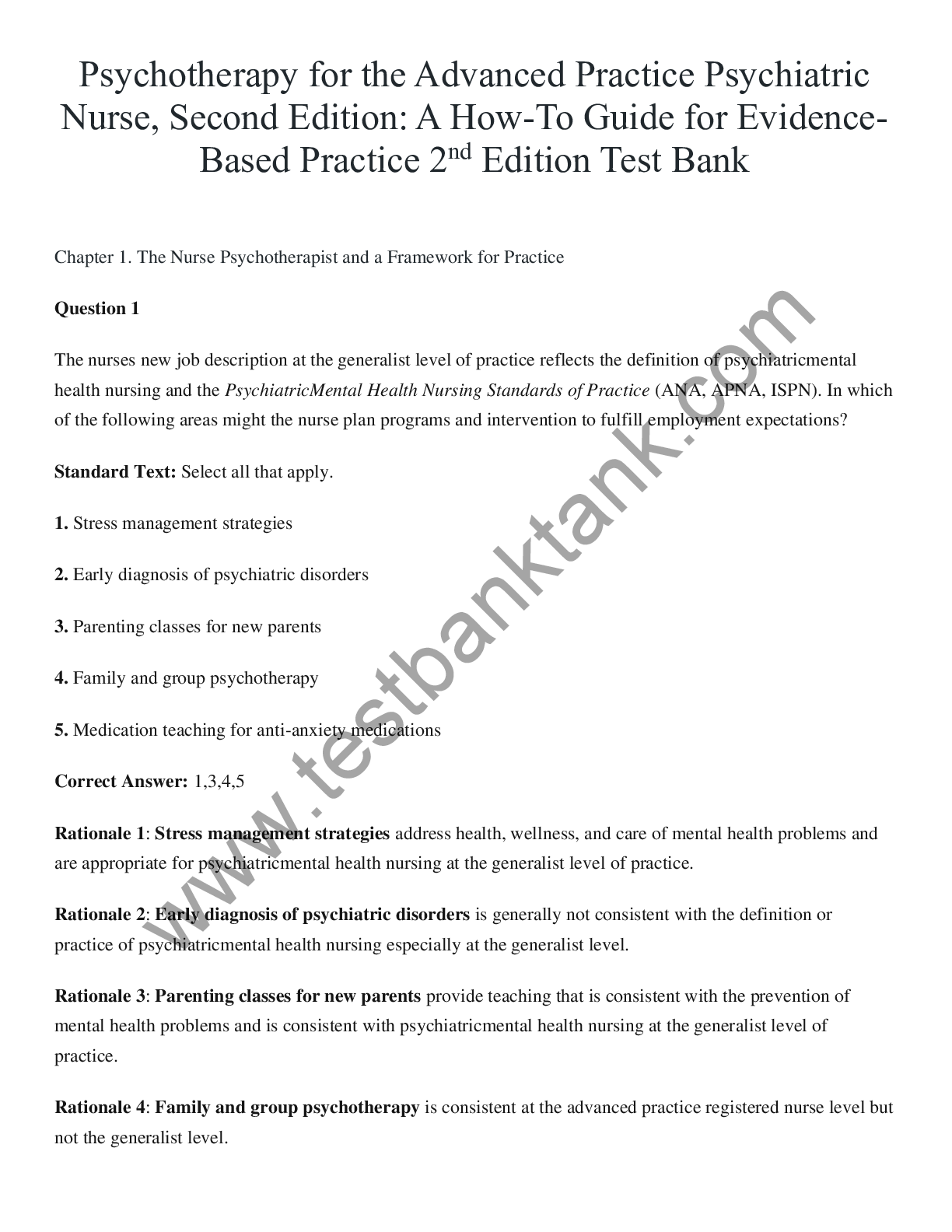
Buy this document to get the full access instantly
Instant Download Access after purchase
Add to cartInstant download
Reviews( 0 )
Document information
Connected school, study & course
About the document
Uploaded On
Jun 11, 2021
Number of pages
86
Written in
Additional information
This document has been written for:
Uploaded
Jun 11, 2021
Downloads
0
Views
41


